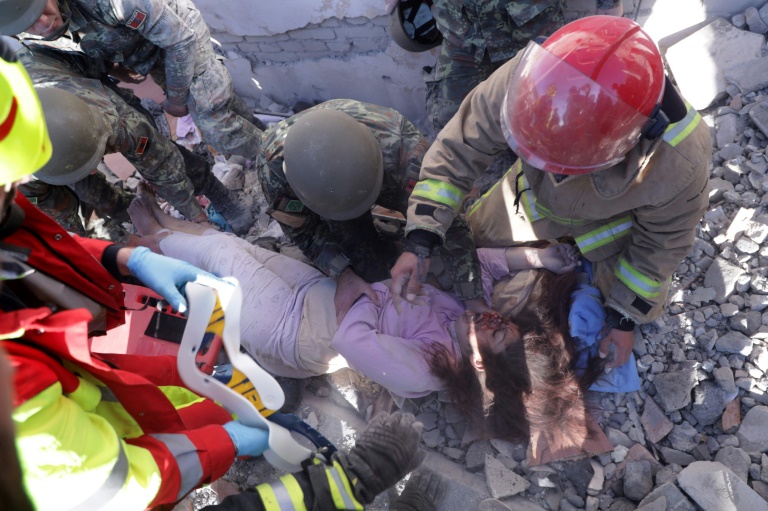
Rescuers were still recovering survivors a day after the earthquake hit. (Photo: AFP)
Emergency workers in Albania on Wednesday pulled dust-covered corpses from the ruins of buildings gutted by a violent earthquake, in a tireless search for survivors as the death toll crept towards 30.
Tirana declared a state of emergency in the areas hardest-hit by Tuesday's 6.4 magnitude earthquake: the coastal city of Durres and the town of Thuman, where victims were trapped by toppled apartments and hotels.
Devastated relatives wept as search teams in Thumane unearthed the bodies of a married couple, Pellumb and Celike Greku, from one of the buildings torn down by the strongest earthquake to strike Albania in decades.
"Terrible, terrible," an elderly woman dressed in black shouted, pulling at her hair as the bodies in pajamas were wrapped in blankets and carried away.
Their son Saimir, who was visiting from abroad, was rescued alive from the rubble Tuesday night but later died in hospital, according to relatives and neighbours.
"They went to heaven together, they were very honest and poor people," said Valbona Cupi, 60, another local, in tears.
Nearby, rescue teams were combing another crumbled building in hopes of reaching a young woman they believed may still be alive after the more than 24-hour ordeal.
Earlier in the day, they pulled out the body of a young man.
- New houses by 2020 -
By mid-day Wednesday, the official death toll was 27 after the defence ministry revised down an earlier figure of 28.
Some 45 people had also been rescued, the ministry said.
There was no estimate on how many people remained missing.
Around 650 people have been treated for mostly minor injuries, according to Albania's health ministry.
Aftershocks continued Wednesday, with a 5.3 magnitude quake shaking buildings in the seaside town of Durres and spreading panic after it struck just off the coast, the European Mediterranean Seismological Centre reported.
Earlier in the day, a 6.1-magnitude underwater earthquake rocked the island of Crete in neighbouring Greece.
More than 27 buildings were badly damaged, with several reduced to dust, in Durres, a beach destination on the Adriatic coast.
Thousands of people spent the previous night sleeping in tents or on the grass of the city's football stadium.
Many were afraid to return home as the aftershocks rattled nerves and temporarily halted rescue work.
During a visit to Durres, Prime Minister Edi Rama said the government would arrange for homeless families to be moved into hotels.
"We cannot spend the winter under open skies or in tents," he said, pledging to put each family in a new home by 2020.
In the district of Keneta, emergency workers and relatives kept up the search for a family of six -- two parents and four children -- whose home was flattened by the earthquake.
"Hope is the last thing that dies," said Asije, 40, a close relative of the Lala family who had moved to the port city from Albania's poor north in search of a better life.
Another relative, Hasan Lala, was working with rescuers who used pickaxes, shovels and their hands to clear debris and move slabs of concrete.
"The rescue operation is very difficult because you can't use heavy machinery, you have to work with your hands," he said, as distraught neighbours watched from the house next door.
- Day of mourning -
Albania is one of the poorest countries in Europe, but experts, rescue teams and emergency aid have flowed in from around the continent.
Tirana declared Wednesday a national day of mourning and canceled festivities planned for Independence Day celebrations on November 28 and 29.
In an act of solidarity, neighbouring Kosovo, whose population is mostly ethnic Albanian, also went into official mourning.
Two Kosovar brothers, Shemsedin and Isa Abazi, were among those killed in Durres when their hotel collapsed, according to Pristina.
The powerful quake struck just before 4:00 am (0300 GMT) on Tuesday.
Earthquakes are common in the Balkans due to the movements two large tectonic plates -- the African and Eurasian -- and the smaller Adriatic micro-plate.


